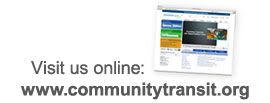By Caryn Walline, TDM & Outreach Specialist
At Community Transit, we work hard to operate by the motto
“Earth Day, Every Day.”
Recently, the agency celebrated Snohomish County and Bothell businesses and commuters that walk the talk (sometimes literally!) at our
2012 Smart Commuter Awards Luncheon. The ceremony honored individuals and companies that reduced greenhouse gas emissions and congestion by using greener alternatives to driving alone such as riding transit, vanpooling, carpooling, biking and walking.
This year’s honorees prove that choosing sustainable transportation options not only helps individuals save money and stress, but also makes our community a better place to live and work for everyone.
Employer of the Year – Crane Aerospace & Electronics
By promoting the Curb the Congestion program, Crane Aerospace was able to encourage their employees to remove 2,117 trips on 164th Street in 2012.
Employee Transportation Coordinator of the Year – David Kemp, Brooks Sports
In 2012, David Kemp launched the Commute Happy campaign at Brooks Sports in Bothell to motivate his employees to try greener travel options. During the Commute Happy campaign, Brooks’ employees reduced more than 35,000 lbs. of CO-2 and logged more than 3,800 trips using green commute options.
Smart Commuter of the Year – Astrella Norell, Brooks Sports
Astrella commutes to her job as an Apparel & Product Developer at Brooks Sports by bus most days. She also decided four years ago to live without a car and uses the money she saves on gas, insurance and car loans to travel.
 |
Caryn accepted the Employer of the Year
award from Bob Drewel at the
2011 Smart Commuter Awards when she was
an ETC. Now Caryn facilitates ETC activity
for Community Transit. |
|
The 2012 award recipients were all from businesses throughout Snohomish County and Bothell who support Washington State’s
Commute Trip Reduction (CTR) goals. Community Transit receives funding from the state to help these employers reduce single-occupant vehicle trips to their worksites by providing services such as the Smart Commuter Awards, advanced training for Employee Transportation Coordinators (ETCs), a Guaranteed Ride Home program, transportation fairs, and resources on commute alternatives to approximately 24,000 employees at 74 worksites.
As a former ETC at Puget Sound Energy – Bothell, the winner of the 2011 Employer of the Year Smart Commuter Award, I have personally seen the positive affects that the Commute Trip Reduction program has on businesses and employees.
The benefits to the company were being able to provide a desirable benefit to our employees that helped with recruiting and retention, while also meeting Puget Sound Energy’s mission to protect the environment. Employees participating in the Puget Sound Energy CTR program were able to save money on gas, were less stressed and enjoyed living healthier, greener lives.
Commute Trip Reduction can also have major impacts on air quality and congestion throughout our communities. Across the state of Washington, participants in the CTR program reduce more than 71,500 tons of greenhouse gas emissions each year and save commuters more than $22 million in fuel.
Here in Snohomish County, businesses in six out of nine jurisdictions that receive Community Transit’s CTR services reduced drive-alone trips since 2007, resulting in a savings of almost 28 pounds of greenhouse gas emissions per employee each day.





















